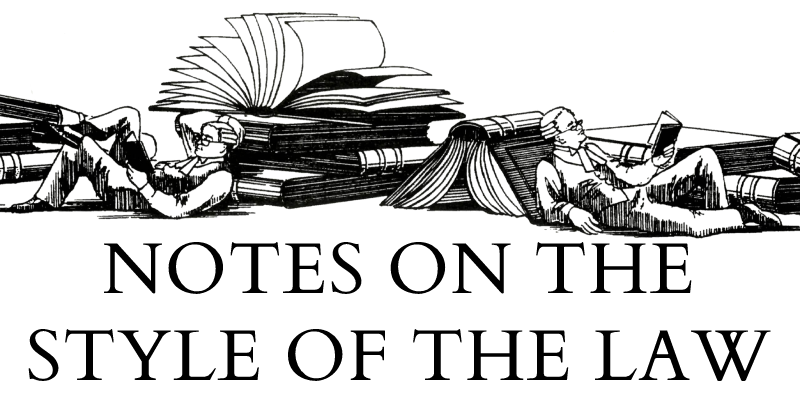
 judicial writing
judicial writing  close readings
close readings  Indian law
Indian law  Supreme Court of India
Supreme Court of India  law and literature
law and literature  James Joyce
James Joyce  allusions
allusions  openings
openings  similes
similes 

Opening a judgment is a delicate art and one which has a variety of approaches. The perhaps most famous opening is that of the Lord Denning MR in Hinz v Berry: ‘It happened on April 19, 1964. It was bluebell time in Kent.’ [1970] 2 QB 40, 42, CA, though a great many judges have carefully honed the craft of openings. One recent contender for a brilliant opening is that of HHJ Clarke in Evans v John Lewis PLC: ‘The dragon is a creature of myth, dating back to ancient times and found in cultures across the world.’ 2023] EWHC 766, para 1, IPEC However, as with any area of writing, the greater the reward, the greater the risk. A literary or unusual opening can reach heights much more than a plain statement introducing a case, but it can also be far more excruciating and annoying than a simple beginning. The recent opening paragraph of Chandrachud CJ in the Supreme Court of India in the case of Cox and Kings Ltd v SAP India Pvt Ltd, 2023 INSC 1051 which considered the ‘group of companies doctrine’ in arbitration, This is a controversial doctrine in international arbitration which allows companies which are not signatories to the agreement but connected to a signatory company to be compelled to arbitration in some circumstances; see generally M Moses, The Principles and Practice of International Commercial Arbitration (3rd edn, Cambridge 2017) 41–42 and P Ferrario, ‘The Group of Companies Doctrine in International Commercial Arbitration: Is There any Reason for this Doctrine to Exist?’ (2009) 26 J Int Arb 647. is an example of how not to open a judgment:
More than a century ago, James Joyce published Ulysses. Joyce experimented with the narrative technique by extensively using a stream of consciousness. In its modernist narrative technique, Ulysses is feted by literary critics and novelists as a literary masterpiece. Novelists such as Vladimir Nabokov and T S Elliot [sic] eulogized it as a divine work of art. However, others such as Virginia Woolf and Aldous Huxley criticized the novel for being technical and boring. Despite the varied criticism, the legacy of Ulysses endures particularly because its experimental narrative technique challenged the conventional literary style. Similar is the case of the group of companies doctrine—a modern theory which challenges the conventional notions of arbitration law. It is celebrated by some, reviled by many others. Yet, its legacy continues.
The simile joining the reception of Ulysses to the group of companies doctrine is artificial and relies on nothing more than the fact that both are controversial. In other words, Marmite has about as much relationship to this area of arbitration as does Joyce’s novel. The comparison does nothing to enrich the reader’s understanding of the law or to make the average citizen understand the issues at play in this somewhat recondite area of arbitration practice.
The allusion seems to serve no purpose and feels forced, as if Chandrachud CJ was simply trying to show off his learning. Chandrachud CJ is, of course, very learned, with an SJD from Harvard Law School (where, as an LLM student he was an Inlaks Scholar and won the Joseph Beale Prize). No reasonable reader could doubt His Lordship’s breadth of knowledge, including in fields beyond the law (eg, His Lordship has an honours BA in economics and mathematics from St Stephen’s College, Delhi). It is an unfortunate irony that forcing irrelevant literary trivia into the beginning of the judgment has the entirely misleading effect of looking like desperation to flaunt intelligence (which is usually the province of the insecure unintelligent).
More generally, literature and the law are so often paired that an entire sub-field of law & literature has arisen to discuss how they are joined. Many great judgments include literary allusions of one sort or another and tasteful literary allusions serve to make a judgment more memorable—such as the Lord Atkin’s famous allusion to Lewis Caroll’s Alice in Liversidge v Anderson. [1942] AC 206, 245, HL However, the great literary allusions in law share one thing in common: they serve to illustrate and enhance our understanding of the case. Great literature can, with economy and felicity, pierce to the heart of questions which are difficult to consider in purely legal prose.
Chandrachud CJ’s opening, on the other hand, is not even a literary allusion, since the content of Ulysses plays no rôle in it whatsoever. It is merely irrelevant trivia that leaves the reader, if anything, more confused about the group of companies doctrine. Careful readers may be surprised to hear me criticise irrelevant trivia, given my longstanding interest in seemingly utterly irrelevant minutiæ. However, I am not in any way opposed to irrelevant trivia, but, rather, simply ask it be presented in places where irrelevant trivia can increase enjoyment of life, not at the head of important judgments! One should open with allusions or figurative references only where it naturally fits with the content. Otherwise, it is far better to enjoy the safety of simplicity and directness rather than plunge into the abominable depths of agony caused by misfired similes.

© 2023; 2 Car III, Elijah Z Granet, but licensed to all under the terms of Creative Commons licence
CC-BY-SA 4.0
Published by

GRANET PRESS
LIMITED


Other than the one typo (“show of”), brilliant. Chandrachud CJ seems particularly fond of quoting Joyce. He did so a year ago at another lecture, similarly without context (and, by the way, he insists on pronouncing it UH-ler-seez, not YOO-ler-seez). The scuttlebutt gains traction; the common view is that this is cobbled together by some law clerk or associate, one whose over-enthusiasm is surpassed only by the profundity of his or her ignorance of what is or is not appropriate in a judgment. Besides, there is not even an attempt to get the facts straight. The quoted paragraph pretends to be authoritative about Nabokov too, though his lectures suggest precisely the opposite of what is attributed to him here.
ReplyDeleteMany thanks for spotting the typo! A tip of my hat!
Delete